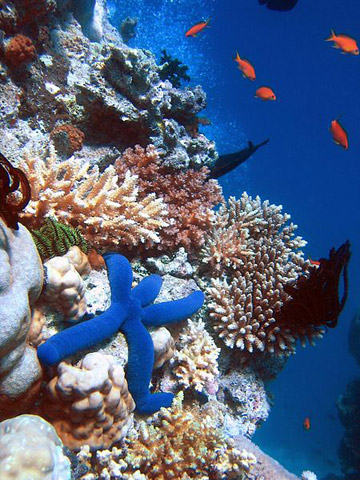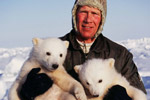Scientists become increasingly stark about the choices facing humanity on global warming

Debris in Tacloban, Philippines after devastating Typhoon Haiyan. Higher storm surges due to climate change are worsening damage from hurricanes and other tropical storms. Photo by: Trocaire/Creative Commons 2.0
Twenty-six years after the founding of the Intergovernmental Panel on Climate Change (IPCC), the Nobel Prize-winning group of scientists and world governments has released a new synthesis report that warns in its strongest tones yet that climate change must be dealt with. None of the findings are surprising—they have been released in earlier assessments throughout the year—but the terms in which they are written are the starkest yet, especially given this is coming from the conservative scientific community.
“Warming of the climate system is unequivocal, and since the 1950s, many of the observed changes are unprecedented over decades to millennia. The atmosphere and ocean have warmed, the amounts of snow and ice have diminished, and sea level has risen,” reads the new synthesis report, which notes that it is “extremely likely” humans are the major driver behind current global warming, i.e. scientists are 95 to 100 percent certain.
The report finds that global warming will likely continue for centuries, even if greenhouse gas emissions dropped to zero today. Yet humanity now has to decide between a pace of warming that human society—and much of nature—can adapt to and one that wreaks irreversible harm.
 Coral reefs, like this one in Australia’s Great Barrier Reef, may be hugely sensitive to ocean acidification and marine warming. Coral reefs are the most biodiverse ecosystems in the oceans. Photo by: Richard Ling/Creative Commons 3.0. |
“Warming by the end of the 21st century will lead to high to very high risk of severe, widespread, and irreversible impacts globally,” reads the report, in its strongest statement on this to date. It also notes that impacts are not far-flung in the future, but already being felt around the world.
However, the report was not all gloom-and-doom. Instead, it noted that humanity—and their governments—have a clear choice regarding the future.
“We have the means to limit climate change,” R. K. Pachauri, Chair of the IPCC, said. “The solutions are many and allow for continued economic and human development. All we need is the will to change, which we trust will be motivated by knowledge and an understanding of the science of climate change.”
Indeed, recent research has shown that instead of devastating the global economy—an argument often used by climate change deniers—dealing with climate change would actually be quite cheap. An IPCC report released in April found that combatting climate change would decrease global growth by just 0.06 percent over the century. However, this report didn’t take into account the economic benefits of switching to renewable energies, such as new jobs, pollution reductions, and greater price stability for electricity.
“The world can afford to fight climate change. This will neither cripple economies nor stop development—to the contrary. What is clear is that inaction will be much more costly, even when considering conservative estimates,” said Samantha Smith, the head of WWF’s Global Climate and Energy Initiative.
Still, it’s a tall order. The IPCC, which some activists have criticized as being too conservative, says that greenhouse gas emission must be cut by 40 to 70 percent by 2050 in order to avoid catastrophic climate change. Moreover, by the end of the century, emissions will have to be near zero, meaning that unless carbon capture and storage makes good, fossil fuels as an energy source must go the way of whale blubber.

Thickly packed sea ice in the Arctic from a photo taken in 1949. One day thick, stable sea ice in the Arctic will likely be a thing of the past as the Arctic is warming around eight times faster than the rest of world according to a new analysis. Photo by: Rear Admiral Harley D. Nygren.
If concerted action isn’t taken to lower greenhouse gas emissions however, global temperatures could rise as much as five degrees Celsius (nine degrees Fahrenheit) by the end of the century, creating a world wholly different from the one we live in today.
Warnings over global warming have been ratcheting up for decades as the science—and the understanding of the threat posed—has become stronger.
“We do not need any more reports—we need action. We don’t have any more time to coddle fossil fuel billionaires or politicians who will eschew responsibility at every corner,” said Sierra Club Executive Director Michael Brune.
In September, over a half a million people worldwide marched for action on global warming according to organizers, including 400,000 in New York City, where global leaders were gathering for discussions on climate change. It was the largest climate march in history and the biggest march in New York City since protests against the Iraq War.
“Science has spoken. There is no ambiguity in their message,” U.N. Secretary-General Ban Ki-moon during the launch of the report. “Leaders must act. Time is not on our side.”
Leaders will have their next opportunity to act in December. That’s when governments from around the world meet in Lima, Peru for the annual Conference of the Parties (COP). This year’s conference is pivotal as it’s meant to build momentum for a global agreement in 2015 in Paris.

Mendenhall glacier in 2007. The glacier has receded nearly two miles since the 1950s due to global warming, creating a lake at the bottom of the glacier. Vanishing glaciers leads to rising sea levels and water issues. Photo by: Rhett A. Butler.
Related articles
Will 2014 be the warmest year on record?
(10/29/2014) With the news that September was the warmest on record globally, 2014 takes one step closer to being the warmest year since record-keeping began in the late 19th Century. Last week, NOAA announced that September was 0.72 degrees Celsius (1.30 degrees Fahrenheit) above the 20th Century average, not only making it the hottest yet, but further pushing 2014 past the current ceiling.
Coal, climate and orangutans – Indonesia’s quandary

(10/21/2014) What do the climate and orangutans have in common? They are both threatened by coal – the first by burning it, and the second by mining it. At the recent United Nations Climate Summit in New York, world leaders and multinational corporations pledged a variety of actions to reduce greenhouse gas emissions and deforestation to avert a looming disaster caused by global warming.
Could California be facing a mega-drought?

(10/13/2014) Scientists and politicians, everyone agrees: California is in deep trouble. As the state enters its fourth year of drought and the soil has never been drier. Some look at the sky with hope that El Niño will bring much needed rain. But most are starting to wonder if this is just the beginning. Are we entering a mega-drought that could last for more than a decade?
Forest fragmentation’s carbon bomb: 736 million tonnes C02 annually
(10/09/2014) Scientists have long known that forest fragments are not the same ecologically as intact forest landscapes. When forests are slashed into fragments, winds dry out the edges leading to dying trees and rising temperatures. Biodiversity often drops, while local extinctions rise and big animals vanish. Now, a new study finds another worrisome impact of forest fragmentation: carbon emissions.
The only solution for polar bears: ‘stop the rise in CO2 and other greenhouse gases’

(10/08/2014) Steven Amstrup, Chief Scientist for Polar Bears International, has worked diligently on polar bears for over 30 years. He radio-collared some of the first bears and discovered that annual activity areas for 75 tracked females averaged at a stunning 149,000 square kilometers. His recent work highlighted the cost of global warming to these incredible animals and the sea ice they so closely depend on.
Throng of 35,000 walruses is largest ever recorded on land, sign of warming arctic

(10/01/2014) A mass of thousands of walruses were spotted hauled up on land in northwest Alaska during NOAA aerial surveys earlier this week. An estimated 35,000 occupied a single beach – a record number illustrating a trend in an unnatural behavior scientists say is due to global warming.
Turning point for Peru’s forests? Norway and Germany put muscle and money behind ambitious agreement

(09/24/2014) From the Andes to the Amazon, Peru houses some of the world’s most spectacular forests. Proud and culturally-diverse indigenous tribes inhabit the interiors of the Peruvian Amazon, including some that have chosen little contact with the outside world. And even as scientists have identified tens-of-thousands of species that make their homes from the leaf litter to the canopy.
Norway to pay Liberia to stop deforestation

(09/23/2014) In one of the many major announcements that have come out of the UN Climate Summit in New York this week, Norway says it will pay Liberia to stop cutting down its forests. Norway’s payment will come on the form of development aid for the war-torn, impoverished, and now Ebola-ridden West African nation.
Leonard DiCaprio to UN Climate Summit: ‘You can make history or you will be vilified by it’
(09/23/2014) Actor, environmental activist, and recently named UN Messenger of Peace, Leonardo DiCaprio, spoke today to a UN Climate Summit. The summit, which is hosting the largest gathering of world leaders to address the crisis in five years, is meant to pave the way for a new climate agreement in Paris in 2015.
Climate coup: Rockefeller announces they are dropping fossil fuel investments
(09/22/2014) In 1870, John D. Rockefeller founded the Standard Oil Company. Rapidly becoming the world’s largest oil refiner, Standard made Rockefeller a billionaire and one of the world’s greatest philanthropists. 144 years later and John D. Rockefeller’s descendants have announced they are stripping fossil fuels from the Rockefeller Brothers Fund, a private charity with around $860 million in assets.
Chinese now emit more carbon per capita than Europeans
(09/22/2014) Last year, the people of China emitted more carbon per person than those in the EU, according this year’s Global Carbon Budget. The report, updated annually, also found that global emissions jumped 2.5 percent last year and are set to hit a record high of 40 billion tonnes this year. The findings highlight how little global society has done to stem emissions, despite numerous pledges and past global agreements.
Over half a million people march for climate action worldwide, shattering turnout predictions
(09/22/2014) Around 570,000 people took part in marches around the world yesterday calling for action on climate change. By far the largest event was in New York City, which had been dubbed the biggest climate march in history weeks before. Organizers estimate that 400,000 people showed up to the march in Manhattan, shattering predictions.